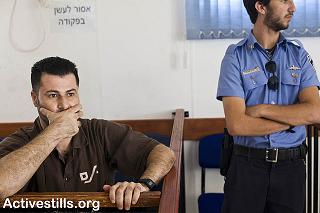 Abdallah Abu Rahmah. Photo by Oren Ziv, Activestills
Abdallah Abu Rahmah. Photo by Oren Ziv, ActivestillsAbdallah Abu Rahmah, Coordinator of the Bil’in Popular Committee, will be released today, 14 March 2011, after 15 months in a military prison.
Abu Rahmah was arrested on 10 December 2009. On 11 October 2010, Abu Rahmah was sentenced to 12 months imprisonment including time served, which would have him released from prison on 18 November 2010. Following the military prosecution’s appeal, he was kept in jail on the order of the Military Court of Appeals – which directly contradicts Israeli High Court jurisprudence on the issue, which stipulates that only in the most extenuating of circumstances is a prisoner to be kept under arrest after his term has been served. During court sessions, the military prosecution has stated that it wishes to “make an example” of Abu Rahmah.
The Association for Civil Rights in Israel reiterates its position, that the IDF systematically infringes on freedom of expression and freedom of protest of activists against the Separation Barrier, which separates Palestinian farmers from their lands, by declaring the entire area as a closed military zone during protests and by rendering all demonstrations as illegal.
To read ACRI’s full position regarding the Bil’in weekly demonstrations and freedom of expression and protest, click here.
Below is a letter, written by Abdallah Abu Rahmah while he was in prison. The letter was read on stage during the Human Rights March, 10 December 2010.
“A year ago tonight, on International Human Rights Day, our apartment in Ramallah was broken into by the Israeli military in the middle of the night, and I was torn away from my wife Majida, my daughters Luma and Layan, and my son Laith, who at the time was only 9 months old.
As the Coordinator of the Bil’in Popular Committee against the Wall and Settlements, I was convicted of ‘organizing illegal demonstrations’ and ‘incitement.’ The ‘illegal demonstrations’ refer to the nonviolent resistance campaign that my village has been waging for the past 6 years against Israel’s Apartheid Wall, which is being built on our land. I find it strange that the military judges could call our demonstrations illegal and charge me for participating in and organizing them, after the world’s highest legal body, the International Court of Justice in The Hague, has ruled that Israel’s wall in the Occupied Territories must be dismantled. Even the Israeli Supreme Court ruled that the wall’s route in Bil’in is illegal.
Despite the occupation’s constant incitement to violence, in Bil’in we have chosen a different path. We have chosen to protest nonviolently together with Israeli and International supporters. We have chosen to carry a message of hope and real partnership between Palestinians and Israelis in the face of oppression and injustice. It is this message that the Israeli occupation is attempting to crush through its various institutions, including the military courts.
In the year that I have spent in prison, the military has carried out dozens of night raids in Bil’in, with the purpose of removing those involved in the popular struggle against the occupation. In 2010, children in Bil’in and throughout the West Bank are still being awakened in the middle of the night to find guns pointed at their heads.
My eldest daughter, Luma, was 9 years old when I was arrested. She is now 10. After my arrest, she began going to the Friday demonstrations in our village. She always carries a picture of me in her hands. The adults try to look after her, but I still worry about my little girl. I wish that she could enjoy her childhood like other children, that she could be studying and playing with her friends. But through the walls and barbed wire that separate us, I hear my daughter’s message to me, saying: ‘Baba, they cannot stop us. If they take you away, we will take your place and continue to struggle for justice.’ This is the message that I want to bring you today – from beyond the walls, the barbed wire, and the prison bars that separate Palestinians and Israelis.”







